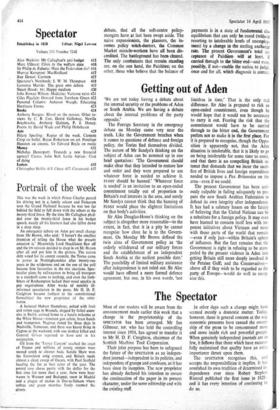Put not thy trust in Paish
Last week we argued that, even within the overall framework of a no-change budget, Mr Callaghan still needed to attend to three crucial points : the restoration of personal incentives, the revival of company profits and the retrenchment of public expenditure. In the event, the nation has had to be con- tent with the most exiguous form of lip ser- vice to these needs. But it would be wrong to conclude from this that the whole occasion was a waste of time. On the con- trary: the Chancellor's speech—for all its lack of fiscal measures and its cliché-ridden prose—was an event of major importance.
If one man in Britain deserves to be recognised as the architect of last week's budget, it is Professor Frank Paish of the London School of Economics, the refiner of (and tireless propagandist for) the Paish theory of economic manage- ment—although justice demands that his name should be coupled with that of the original begetter of the theory : Professor A. W. Phillips, also of London University. For although Paishism has been assured of a respectful hearing in Whitehall for many years now, and indeed provided the main in- spiration of Mr Selwyn Lloyd's policies, Mr Callaghan became on Tuesday the first Chan- cellor to embrace the Paish doctrine ex- plicitly and without reservation.
It certainly has a beguiling simplicity. According to Professor Paish, Britain's balance of payments deficits are solely caused by inflation, and inflation in turn is a con- sequence of an inadequate margin of unem- ployment. What's more, the amount of unemployment needed to eliminate inflation altogether can (according to the Pro- fessor) be confidently put at around 21 per cent. From then on the economy can be allowed to grow steadily in line with the rate of growth of productive capacity—perhaps 3 per cent or thereabouts a year—without any fear of a payments crisis.
Thus Paish—and thus, now, Callaghan. Unemployment is now at 2 per cent: by his neutral budget, the Chancellor deliberately set out to let it rise marginally further over the next twelve months. 'A lower average pressure of demand [Paish-language for a higher average level of unemployment] than we have permitted in the past,' he de- clared in a key section of his speech, 'should also mean that we do not again suffer the kind of upsurge that has so often damaged the balance of payments.' By adopting this policy, he continued, we would be able 'to achieve a sustained growth of our national output. This growth would be in line with the rate of expansion of our productive capa- city. . . . In the Government's view [this] is likely to be about 3 per cent per annum.'
Forget for the moment the sad facts that the growth target has at last been whittled down to 3 per cent and that even this, if achieved between now and 1970, would mean a meagre 21 per cent growth over the whole national plan period. What matters crucially is whether Paish is right, and whether this is the right way to run the economy.
There is every reason to believe that he is wrong, and that this is not the way. All that Paish has demonstrated is that wage in- creases fall to a non-inflationary level when unemployment is rising to a slightly higher level: there is no evidence to show that in- flation will not recur when unemployment is stabilised at that higher level. And if it does, all that will have been achieved is an in- crease in hardship and economic waste. Indeed, judging from his latest pamphlet, even the Professor may be uneasily aware of this possibility: he adds in parenthesis, 'if it were found that wages were still rising too fast with unemployment above 21 per cent, restriction of demand . . . would have to be continued to a higher level.'
Again, there must be serious doubt whether industry would invest adequately in new labour-saving plant and equipment so long as there remained a generous margin of un- employed labour. In other words, a Paishite policy could well lead to a lower rate of growth of productive capacity. It is of the essence of Paishism that the rate of growth of productivity is more or less God-given: there is at least equally strong evidence to suggest that, on the contrary, it can be affected by government economic policy: and that while a Paishite policy would tend to reduce it, the real objective of economic policy should be to increase it. debate, that all the soft-centre policy. mongers have at last been swept aside. The naive expansionists, the planners, the in- comes policy witch-doctors, the Common Market miracle-workers have all been dis- credited. The battleground has been cleared. The only combatants that remain standing are, on the one hand, the Paishites; on the other, those who believe that the balance of payments is in a state of fundamental dis- equilibrium that can only be cured (without resorting to intolerable levels of unemploy- ment) by a change in the sterling exchange rate. The present Government's total ac- ceptance of Paishism will at least, if carried through to the bitter end—and even, possibly, if not—enable the nation to judge, once and for all, which diagnosis is correct.































